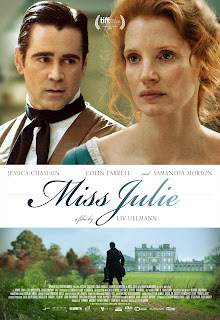Miss Julie (2014)
Liv Ullman, the great Norwegian actress, adapted and directed August Strindberg's classic play, Miss Julie, in 2014. The first interesting choice she made was to change the setting from Sweden to Ireland. Perhaps this was because one of her actors, Colin Farrell, is Irish, but the other two, Samantha Morton and Jessica Chastain, are English and American, respectively. So that's the first thing for students of the play to wrap their mind around.
Otherwise, the play is presented mostly as written by Strindberg. It's a three-hander, with Chastain as the willful daughter of the master of the house, and Farrell as a valet and Morton as a cook. The master, the baron, has left for the evening. Chastain, bored, toys with Farrell, asking him to do things like drink with her, or pick her flowers. He tells her this is inappropriate, but she orders him around like a dog.
In the second half of the film the tables turn, as Farrell reveals that when he was a boy he was in love with her. Eventually they will have sex, and the notion that she might bear his child (the fastest pregnancy ever) propels them to contemplate running away together.
Strindberg was influenced by Darwin in writing this play (he said so in the preface). Chastain and Farrell represent two classes, only one of which will survive by natural selection. Morton, who is Farrell's lover and casual fiancee, is a representation of the status quo. "Class is class," she says to Farrell, objecting to the idea of him and Chastain being on equal ground.
There are also numerous metaphors, most notably a canary that Chastain wants to take with her. The squeamish should look away when Farrell does away with the bird, a prefiguring of what will happen to Chastain.
Ullman directs without much trickery. The play is opened up somewhat, but aside from a prologue of Julie as a girl and the end shot, which is only referred to in the play, the action is confined to the indoors, which gives the film a sense of claustrophobia. Miss Julie is really a filmed play, and should be appreciated on that level. I am a full supporter of such endeavors--if you want to film a play, go ahead and film it as a play. The compulsion to "open up" a play, such as in Who's Afraid Of Virginia Woolf or Glengarry Glen Ross, isn't necessary. The words are enough.
The three actors are all great, but I think Morton steals the show, as she slow boils at what she sees. When she walks on the other two preparing to leave, her quiet, "What is going on here?" pierces the heart.
Otherwise, the play is presented mostly as written by Strindberg. It's a three-hander, with Chastain as the willful daughter of the master of the house, and Farrell as a valet and Morton as a cook. The master, the baron, has left for the evening. Chastain, bored, toys with Farrell, asking him to do things like drink with her, or pick her flowers. He tells her this is inappropriate, but she orders him around like a dog.
In the second half of the film the tables turn, as Farrell reveals that when he was a boy he was in love with her. Eventually they will have sex, and the notion that she might bear his child (the fastest pregnancy ever) propels them to contemplate running away together.
Strindberg was influenced by Darwin in writing this play (he said so in the preface). Chastain and Farrell represent two classes, only one of which will survive by natural selection. Morton, who is Farrell's lover and casual fiancee, is a representation of the status quo. "Class is class," she says to Farrell, objecting to the idea of him and Chastain being on equal ground.
There are also numerous metaphors, most notably a canary that Chastain wants to take with her. The squeamish should look away when Farrell does away with the bird, a prefiguring of what will happen to Chastain.
Ullman directs without much trickery. The play is opened up somewhat, but aside from a prologue of Julie as a girl and the end shot, which is only referred to in the play, the action is confined to the indoors, which gives the film a sense of claustrophobia. Miss Julie is really a filmed play, and should be appreciated on that level. I am a full supporter of such endeavors--if you want to film a play, go ahead and film it as a play. The compulsion to "open up" a play, such as in Who's Afraid Of Virginia Woolf or Glengarry Glen Ross, isn't necessary. The words are enough.
The three actors are all great, but I think Morton steals the show, as she slow boils at what she sees. When she walks on the other two preparing to leave, her quiet, "What is going on here?" pierces the heart.



Comments
Post a Comment